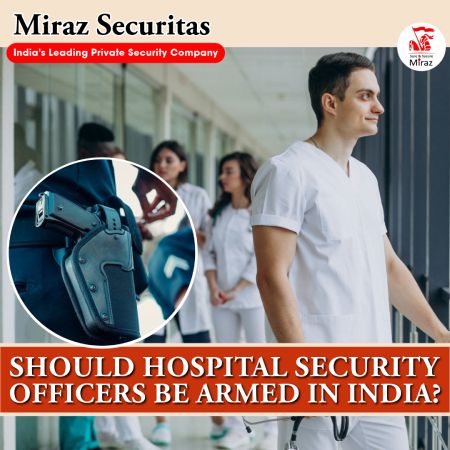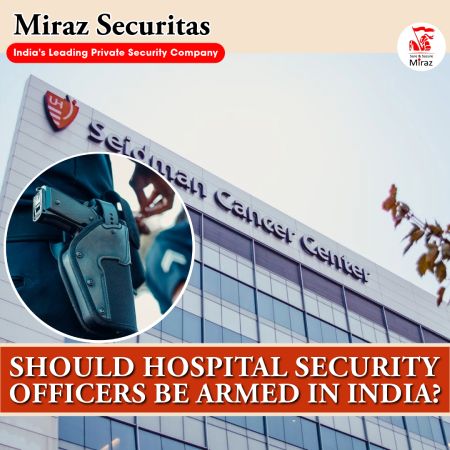In an era where the sanctity of the hospital environment should be an unwavering haven for patients and the medical fraternity, a disconcerting reality is emerging in India. Hospitals, traditionally considered sacred spaces, are no longer immune to the threats that loom in the shadows. The rise of crimes and terrorism across the nation has cast a sinister cloud over the healthcare sector, making it a prominent target for malicious intents. This grim situation beckons a compelling question: should security officers in Indian hospitals be armed?
Let’s find out what Miraz Securitas, the leading security services company for hospitals in Delhi, Gurgaon, and NOIDA has to say about this.
What kind of security threats do Indian hospitals face?
- Terrorism Threat: Hospitals are often crowded and provide easy access to large numbers of people, making them potential targets for individuals or groups with malicious intentions. Terrorists may target hospitals to cause mass casualties, disrupt healthcare services, or attract media attention.
- Violence against hospital staff: Incidents of violence against hospital staff, including doctors, nurses, and other healthcare professionals, have been reported in India. Such violence can occur due to various reasons, including dissatisfaction with medical care, long waiting times, or disagreements with the hospital staff.
- Ransomware Attacks: Hospitals are prime targets for ransomware attacks that can encrypt patient records and demand payment for decryption.
- Phishing Attacks: Cybercriminals may use deceptive emails or messages to trick healthcare staff into revealing sensitive information or clicking on malicious links.
- Data Breaches: Hackers may attempt to breach hospital systems to access patient records, financial data, or personal information.
- Theft and Vandalism: Hospitals may face physical security threats such as theft of medical equipment or vandalism of critical infrastructure.
Should Indian Hospitals hire Armed Security Officers?
Pros
- Violence Mitigation: Highly trained hospital security officers, seamlessly integrated with medical teams, proactively detect and prevent violence. They build a personal rapport with staff, patients, and families to nip issues in the bud, reducing the likelihood of violent incidents.
- Swift Emergency Response: Employing armed security personnel enhances hospital safety by ensuring rapid responses and de-escalation skills in tense situations. During emergencies, they act decisively, safeguarding lives and property. Their presence proves indispensable in critical incidents such as active shooter situations, potentially saving lives.
- Rigorous Training: Armed security personnel serve as the frontline defence for public safety, undergoing comprehensive training in safe conduct, firearm use, suspect restraint, and coordinated response with law enforcement to maintain peace and avert violence.
Cons
- Legal complexities: India has strict gun control laws, making it challenging to arm security officers without navigating a complex legal process.
- Escalation risks: Arming security personnel may lead to an increased likelihood of violence in high-stress situations, potentially endangering patients and staff.
- Training costs: Providing adequate firearms training and certification can be expensive and time-consuming.
- Psychological impact: The presence of armed guards in hospitals might create an atmosphere of fear and anxiety, deterring patients and visitors.
- Image and trust: Arming security officers can negatively impact the hospital’s image and patient trust, potentially hindering the healing environment.
The very idea of arming security personnel within healthcare facilities sparks a contentious debate, necessitating a nuanced consideration of both the pros and cons. While it is undeniable that hospitals must provide a secure environment for patients, doctors, and the entire medical staff, the prospect of introducing firearms into a healthcare setting warrants a careful evaluation. Hospitals are different from banks or government buildings where security personnel are commonly armed. They are places of healing and hope, where the well-being and comfort of patients should reign supreme. The presence of firearms, even in the hands of trained professionals, may inadvertently amplify the sense of unease among patients and their families. Therefore, hospitals should conduct a comprehensive risk assessment to determine whether there is a significant threat to the safety and security of individuals on their premises that justifies arming security personnel.
- Home Security Tips If You Are a Single Mom - July 26, 2024
- What Can Security Do To Protect A Mine Site? - July 17, 2024
- What a Security Guard can do for an Oil and Gas Plant Unit? - July 12, 2024

